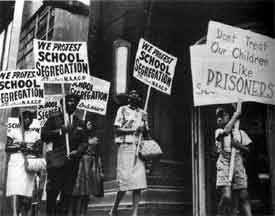1960 Protest in South

|
The year 1960 marked a pivotal moment in the Civil Rights Movement in the United States, characterized by widespread protests throughout the South. These protests were predominantly led by Black student activists who championed the cause of integrating restaurants and other public accommodations. The tactic they employed, known as sit-ins, became a powerful tool in the struggle for racial equality.
The sit-in movement began on February 1, 1960, when four Black students from North Carolina Agricultural and Technical State University sat down at a segregated Woolworth's lunch counter in Greensboro, North Carolina, and politely requested service. When they were refused, they remained seated in silent protest. This act of nonviolent resistance sparked a wave of similar demonstrations across the South, as students from various colleges and universities joined in the effort to challenge the entrenched system of segregation.
These sit-ins were strategically organized and executed, demonstrating the discipline and commitment of the young activists. They faced verbal abuse, physical assaults, and arrests, but their unwavering resolve inspired others to join the movement. By the end of March 1960, the sit-ins had spread to 55 cities in 13 states, involving over 50,000 participants. The widespread nature of these protests and the determined efforts of the students forced the nation to confront the injustices of segregation and discrimination.
One of the most significant figures to be drawn into the sit-in movement was Reverend Martin Luther King Jr. King, already a prominent leader in the Civil Rights Movement, lent his support to the student activists. His involvement brought additional attention to the cause and underscored the broader struggle for civil rights. However, King's participation also made him a target for authorities seeking to suppress the movement.
In October 1960, during a sit-in at a department store lunch counter in Atlanta, Georgia, King was arrested along with other protesters. Despite the peaceful nature of their demonstration, they were charged with trespassing. This arrest was particularly significant because it led to King's sentencing for a parole violation stemming from an earlier traffic violation. The judge sentenced King to four months of hard labor in the notorious Reidsville State Prison. The harsh sentence was seen as a punitive measure aimed at deterring further protests and silencing a key leader of the movement.
King's arrest and imprisonment garnered national attention and highlighted the brutality and injustice faced by those fighting for civil rights. It also became a pivotal moment in the 1960 presidential campaign. John F. Kennedy, the Democratic candidate, saw an opportunity to make a significant impact on the Civil Rights Movement and gain the support of Black voters. Kennedy and his brother, Robert F. Kennedy, intervened on King's behalf, making phone calls to local officials and arranging for his release.
Kennedy's actions had a profound effect. On October 26, 1960, King was released from prison, a move that was widely publicized and celebrated by civil rights activists and the Black community. This intervention by Kennedy helped to solidify his support among Black voters, contributing to his narrow victory in the presidential election. It also marked a turning point in the relationship between the Civil Rights Movement and the federal government, signaling a growing willingness to address issues of racial injustice at the national level.
The sit-ins of 1960 and the events surrounding King's arrest demonstrated the power of nonviolent protest and the impact of student activism in challenging systemic racism. The courage and determination of the young protesters inspired a generation and helped to galvanize the Civil Rights Movement, leading to significant legislative and social changes in the years that followed. The year 1960 thus stands as a testament to the enduring struggle for equality and justice in America, and the critical role that grassroots activism and leadership can play in effecting meaningful change.
 >
>